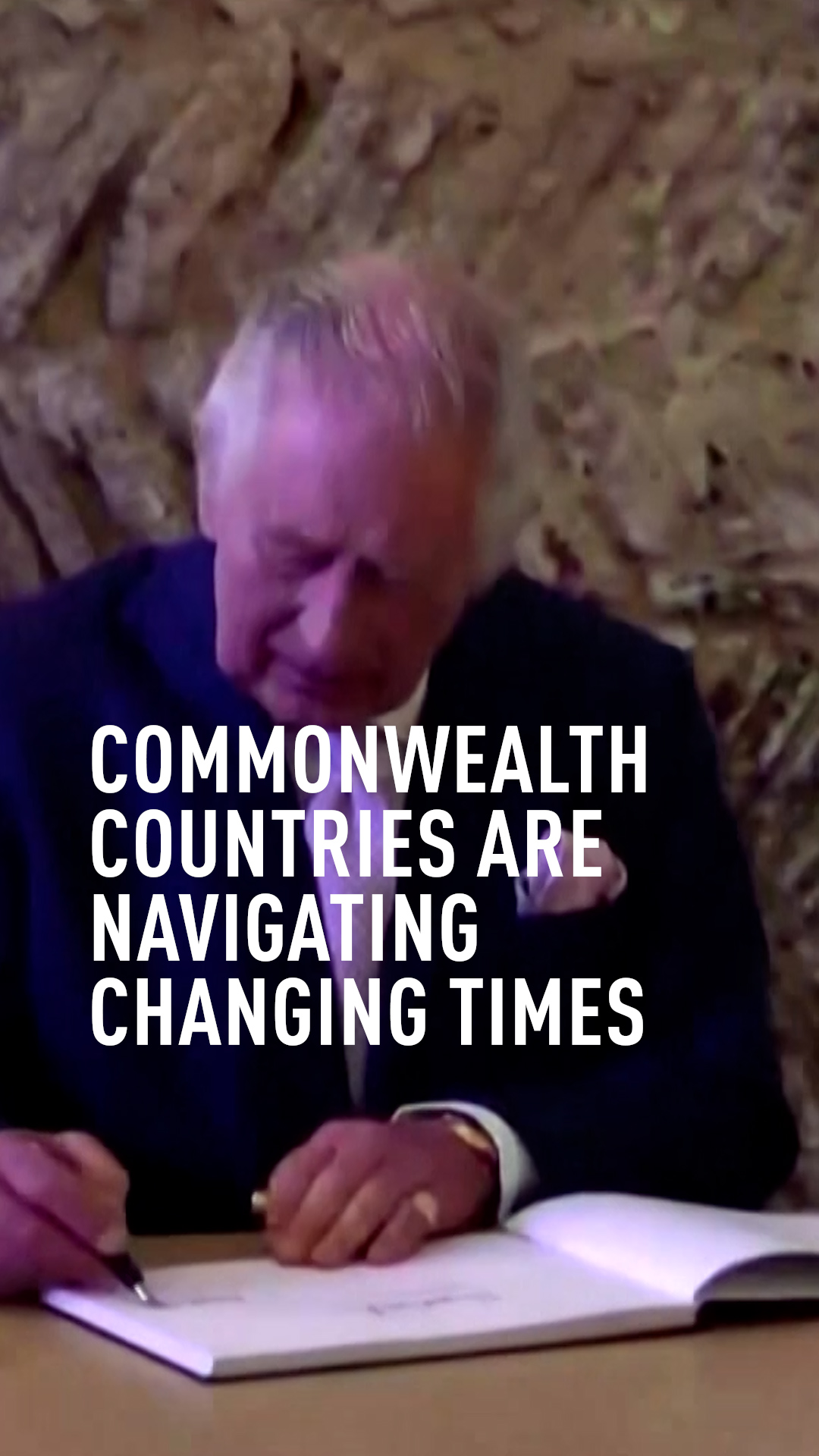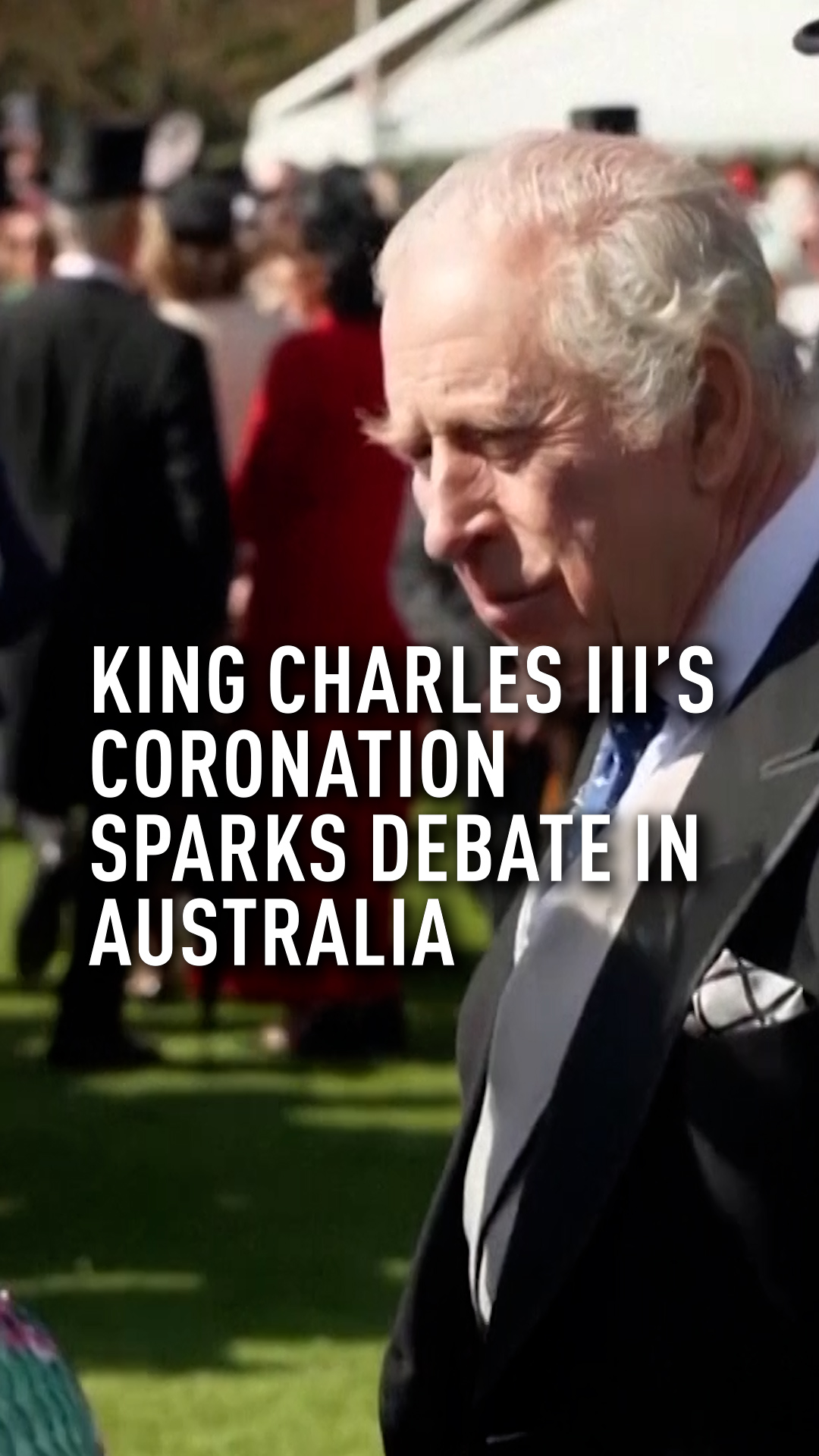
The military procession, the largest of its kind since the 1953 Coronation of Her Majesty Queen Elizabeth II, makes its way down The Mall towards Buckingham Palace during the coronation of King Charles III and Queen Camilla. /Richard Heathcote/Reuters
The military procession, the largest of its kind since the 1953 Coronation of Her Majesty Queen Elizabeth II, makes its way down The Mall towards Buckingham Palace during the coronation of King Charles III and Queen Camilla. /Richard Heathcote/Reuters
King Charles III, 74, has been crowned and is succeeding his mother Queen Elizabeth II who died last September. His 75-year-old wife Camilla was also crowned the Queen.
The monarch is now also the Head of the Commonwealth of Nations, a voluntary association of 56 independent countries in Africa, Asia, the Americas, Europe and the Pacific.
These realms, which include Australia, Canada, Jamaica, Papua New Guinea and New Zealand, represent a minority of the Commonwealth nations: most of the 56 members are republics, even if some still sport the Union Jack on their flags.
Barbados was the most recent Commonwealth country to remove the British monarch as its head of state, replacing Charles' mother, Queen Elizabeth II, with an elected president in 2021. The decision spurred similar republican movements in neighboring Jamaica, the Bahamas and Belize.
The official Commonwealth Twitter account posted a congratulatory message for King Charles on his coronation "on behalf of our family of 56 nations and 2.5 billion people."
There are 21 African countries in the Commonwealth, most were colonized by Britain. But with a new leader at the helm, there are varying opinions about its future.
Some Africans feel that the association is still deeply rooted in its colonial history. A section of Kenyans shared their views with CGTN, with their country having been a member of the Commonwealth since 1963.
03:00

Legacy of colonial oppression
"I don't think much will change. During all those years since I was born we've had the Queen at the helm," said one Nairobi resident James Mutua.
"It is time that the Commonwealth adapted to reflect the changing times," added Wilkister Nyabwa, another resident of the capital.
It is also important to note that the memories of Britain's harsh response to the Mau Mau rebellion in the 1950s are still raw in Kenya.
Many Kenyans are not interested in the coronation "because of the torture during colonialism, because of the oppression, because of detentions, because of killings, because of the alienation of our land," said Herman Manyora, a political analyst and journalism professor at the University of Nairobi.
It's not about caring for the British monarchy, it's about relating.
- Asuman Bisiika, Ugandan political analyst
Not everyone is as critical. In Uganda, political analyst Asuman Bisiika says British culture continues to have a strong influence on young people in the East African country, especially those who follow English football. There is also a lot of goodwill for Queen Elizabeth II.
"It's not about caring for the British monarchy," Bisiika said. "It's about relating."
READ MORE
What's the Commonwealth and who's in it?
Charles addresses Commonwealth over slavery links
Will Charles III be as influential as Elizabeth II?
'Taking back what has been expropriated'
But some South Africans have called for the UK to return the world's largest diamond, known as the Star of Africa, which is set in the royal scepter that King Charles held at his coronation.
The diamond weighs 530 carats and was discovered in South Africa in 1905 and presented to the British monarchy two years later by the colonial government in the country, which was then under British rule.
"The diamond needs to come to South Africa. It needs to be a sign of our pride, our heritage and our culture," said Mothusi Kamanga, a lawyer and activist in Johannesburg who has promoted an online petition, which has gathered about 8,000 signatures, for the diamond to be returned.
“I think generally the African people are starting to realize that to decolonize is not just to let people have certain freedoms, but it's also to take back what has been expropriated from us."
Despite the general apathy towards the pomp and ceremony and opposition to the monarchy by citizens of the Commonwealth countries, the event was well attended by their leaders.
Monarchy, positioned in the past
Australian Prime Minister Anthony Albanesel was amongst them, however, the event came amid a renewed debate about whether the British monarch should remain as the country's head of state.
Experts say the current focus on Indigenous rights in Australia presents a unique opportunity for a movement to push for the country to become a republic, and supporters want to bring the debate to a public vote.
Albanese, who supports a republic, says a referendum will be held when there is sufficient demand, but says it is not imminent.
02:43

They have ever made an apology to the First Nations people or to anyone else in the Commonwealth.
- Craig Foster, Co-Chair, Australian Republic Movement
Historians say Queen Elizabeth II was extremely popular in Australia but King Charles does not enjoy the same level of respect and admiration.
"Charles is being crowned and succeeding his mother and neither of them have ever made an apology to the First Nations people or to anyone else in the Commonwealth," explains Craig Foster, Co-Chair, Australian Republic Movement.
"This really crystallizes the issue of where Australia is headed and how much this monarchy is positioned in the past."

Britain's Queen Camilla and King Charles III travel in the Gold State Coach, back to Buckingham Palace from Westminster Abbey in central London on May 6, 2023, after their coronations. /Adrian Dennis/ AFP
Britain's Queen Camilla and King Charles III travel in the Gold State Coach, back to Buckingham Palace from Westminster Abbey in central London on May 6, 2023, after their coronations. /Adrian Dennis/ AFP
In Canada, dignitaries and fans of the monarchy gathered in Ottawa to mark the coronation with music and poetry, as the Commonwealth nation unveiled new coins and stamps in his honor.
With Prime Minister Justin Trudeau in London attending the coronation itself, back in Ottawa almost 300 officials, military leaders and others took part in the hour-long ceremony in a hall across from Parliament that was capped off with a 21-gun salute.
'Monarchy is outdated'
Among the general public, however, interest appeared muted.
A lone street protester in Ottawa held a sign calling for Canada to abolish the monarchy, echoing the views of two out of three Canadians surveyed in a recent Abacus Data poll.
Intergovernmental Affairs Minister Dominic LeBlanc said the King's values align with those of most Canadians. However, Protestor Alexandria Xavier Phillips was not swayed by arguments that the monarchy provides constitutional stability.
"I want the monarchy to be abolished," he said. "I loved Queen Elizabeth. I believe King Charles is a nice man, but I think the monarchy is outdated and incompatible with democracy."
India has moved on and most Indians have no emotional ties with the royal family.
- Pavan K. Varma, Indian writer and former diplomat
The sentiment is shared by those living in India and Pakistan.
"India has moved on," and most Indians "have no emotional ties with the royal family," said Pavan K. Varma, a writer and former diplomat. Instead, the royals are seen more like amusing celebrities, he said.
And while the country still values its economic and cultural ties with the European country, Varma pointed out that India's economy has overtaken the UK's.
"Britain has shrunk globally into a medium-sized power," he said. "This notion needs to be removed, that here is a former colony riveted to the television watching the coronation of Prince Charles. I don't think this is happening in India."
'They enslaved us for years'
"I don't think we should care much about (the royals)," Milind Akhade, a photographer in New Delhi, said. "They enslaved us for so many years."
In neighboring Pakistan, the majority of its population of almost 243 million people was not even aware that the event was taking place, let alone be interested in watching the ceremony.
However, a contingent of the country's armed forces participated in the event and Prime Minister Shehbaz Sharif also joined a galaxy of foreign royals, officials and heads of the states and governments at the coronation.
Sharif also extended an invitation to King Charles to visit Pakistan.
The Commonwealth may have been lending its voice to issues such as trade, climate change and human rights, but other international bodies already have more specific powers in these areas.
"There are more countries applying even now, so I think the Queen has left our Commonwealth in robust good health," argues Patricia Scotland, Commonwealth Secretary-General.
In recent times, King Charles has said that it is time for the association to confront the legacy of slavery.
But critics warn that the Commonwealth risks fading into irrelevance unless it shows it can improve its citizens' lives.
Subscribe to Storyboard: A weekly newsletter bringing you the best of CGTN every Friday
Source(s): AP
,AFP